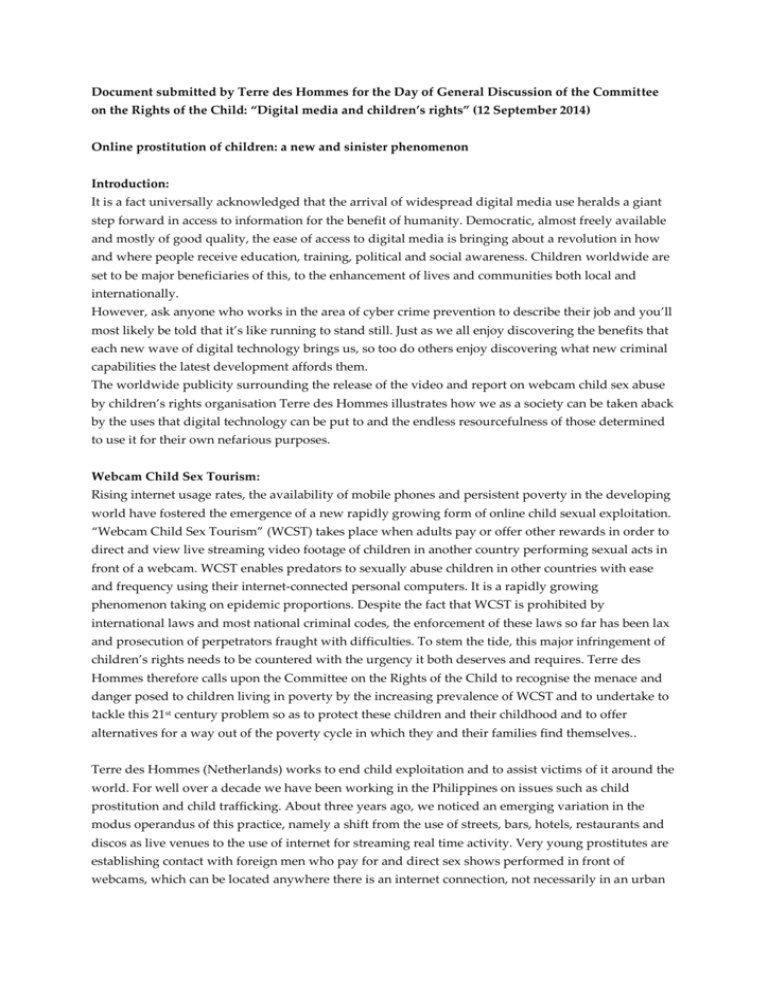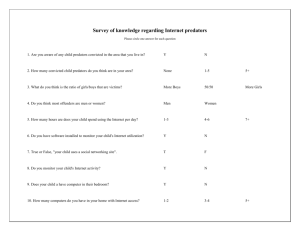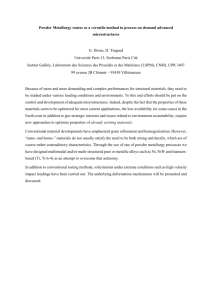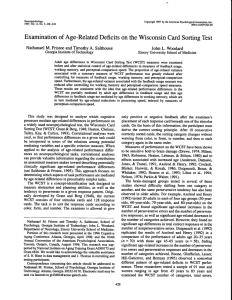
Document submitted by Terre des Hommes for the Day of General Discussion of the Committee
on the Rights of the Child: “Digital media and children’s rights” (12 September 2014)
Online prostitution of children: a new and sinister phenomenon
Introduction:
It is a fact universally acknowledged that the arrival of widespread digital media use heralds a giant
step forward in access to information for the benefit of humanity. Democratic, almost freely available
and mostly of good quality, the ease of access to digital media is bringing about a revolution in how
and where people receive education, training, political and social awareness. Children worldwide are
set to be major beneficiaries of this, to the enhancement of lives and communities both local and
internationally.
However, ask anyone who works in the area of cyber crime prevention to describe their job and you’ll
most likely be told that it’s like running to stand still. Just as we all enjoy discovering the benefits that
each new wave of digital technology brings us, so too do others enjoy discovering what new criminal
capabilities the latest development affords them.
The worldwide publicity surrounding the release of the video and report on webcam child sex abuse
by children’s rights organisation Terre des Hommes illustrates how we as a society can be taken aback
by the uses that digital technology can be put to and the endless resourcefulness of those determined
to use it for their own nefarious purposes.
Webcam Child Sex Tourism:
Rising internet usage rates, the availability of mobile phones and persistent poverty in the developing
world have fostered the emergence of a new rapidly growing form of online child sexual exploitation.
“Webcam Child Sex Tourism” (WCST) takes place when adults pay or offer other rewards in order to
direct and view live streaming video footage of children in another country performing sexual acts in
front of a webcam. WCST enables predators to sexually abuse children in other countries with ease
and frequency using their internet-connected personal computers. It is a rapidly growing
phenomenon taking on epidemic proportions. Despite the fact that WCST is prohibited by
international laws and most national criminal codes, the enforcement of these laws so far has been lax
and prosecution of perpetrators fraught with difficulties. To stem the tide, this major infringement of
children’s rights needs to be countered with the urgency it both deserves and requires. Terre des
Hommes therefore calls upon the Committee on the Rights of the Child to recognise the menace and
danger posed to children living in poverty by the increasing prevalence of WCST and to undertake to
tackle this 21st century problem so as to protect these children and their childhood and to offer
alternatives for a way out of the poverty cycle in which they and their families find themselves..
Terre des Hommes (Netherlands) works to end child exploitation and to assist victims of it around the
world. For well over a decade we have been working in the Philippines on issues such as child
prostitution and child trafficking. About three years ago, we noticed an emerging variation in the
modus operandus of this practice, namely a shift from the use of streets, bars, hotels, restaurants and
discos as live venues to the use of internet for streaming real time activity. Very young prostitutes are
establishing contact with foreign men who pay for and direct sex shows performed in front of
webcams, which can be located anywhere there is an internet connection, not necessarily in an urban
environment but more often in family homes. Terre des Hommes became alerted to this practice and
started its investigation into this relatively new phenomenon.
Our research shows that there are now three different forms of WCST:
a) Children working out of internet cafes, sometimes independently, often for pimps,
b) Children forced by their parents to perform sex shows in front of a webcam from their homes
c) So-called cyber dens, frequently owned by foreign nationals who set up “internet companies”. The
girls working in the dens are usually victims of trafficking or lured by the owners and their
accomplices under false pretences.
Contact is established using public chat rooms. According to information from the UN and the FBI,
there are now some 40,000 public chat rooms where one can encounter paedophiles with 100%
certainty. Often initial contact takes place in a public chat room and subsequently the conversation
moves to a private one. Terre des Hommes’ research indicated the ineffectiveness of many moderators
on the chat rooms they were supposed to be invigilating, some even getting involved in approaching
underage children for sex themselves.
Payment to the owner/operator/pimp is made using international money services such as Western
Union and PayPal.
In addition Terre des Hommes studied the effects of these practices on children. A psychologist
worked in close co-operation with the local NGO partners to identify and interview young victims of
WCST and found that the psychosocial effects are similar to the effects of sexual abuse. Children
display sexualisation at a very early age, often becoming street prostitutes and ladyboys. If they are
coerced by their parents to help the family’s financial situation they develop very skewed feelings
towards these people they love who are supposed to keep them safe. Relationships become very
problematic and the children often resort to drugs and alcohol. Sadly, almost needless to say, their
(basic) education suffers and these children drop out of school, continuing the cycle of poverty.
With the increased internet availability, WCST is a rapidly growing phenomenon. In 2011 Terre des
Hommes and its partners in the Philippines estimated that hundreds of children in Cebu City (2 nd
metropolis after Manila) alone were involved in WCST. Now, three years later, best estimates show
that tens of thousands of children are involved in this sinister practice, demonstrating again the
epidemic proportions of this phenomenon.
Reliable statistics about the prevalence of WCST or the exact number of victims are not currently
available. Nonetheless, one can form an idea of how common a crime WCST might be considering the
estimated number of online environments on which predators are found, the estimated number of
predators connected to the internet, and the estimated number of child victims of WCST.
The US Federal Bureau of Investigation estimates that there are 40,000 public chat rooms on which
predators seek to abuse children. But WCST also occurs on other online spaces.
The FBI and the Special Rapporteur on the Sale of Children, Child Prostitution and Child
Pornography have estimated that there are 750,000 predators connected to the internet at any given
moment. The activities these men (98%) demand of their webcam children range from masturbation to
sex involving another juvenile, often a sibling, to sex with an adult and even bestiality. The age of
children used ranges from 2 years old to 14.
As with any commercial trade, the demand for a product or service will influence its supply. In this
case, the “demand” for WCST is created by the use of children in these live streamed sex shows. As
news reports surface with increasing frequency about Filipino law enforcement agents raiding WCST
operations and rescuing child victims, it appears that the “supply” of child victims of WCST is
growing. That fact would suggest that the global demand at present outweighs the supply.
Alarmed by this vast growing phenomenon, Terre des Hommes decided to shift its focus to the
demand side. Who are these men, how do they establish contact with children, how big is the
demand? We therefore initiated a new project: “Sweetie-1000”, to set up a sting operation in the cybergenerated guise of a ten year old girl from the Philippines.
Initially, to get a sense of the size of the global demand for WCST, we conducted extensive field
research into one of the online environments on which WCST takes place – public online chat rooms.
In order to measure the incidence of predators seeking WCST on a sample of 19 public chat rooms,
four researchers spent a combined total of 1,600 hours over the course of 10 weeks posing as
prepubertal Filipino girls. Over 20,000 predators from all over the world initiated contact, seeking
webcam sex shows from the researchers. That high incidence of predators seeking WCST is clear
evidence that the global demand for WCST is vast.
The extremely low number of adults convicted for engaging as customers in WCST prompted the
question of whether law enforcement agencies are simply unable to identify predators seeking WCST.
During the 10 weeks that the Terre des Hommes Netherlands researchers spent interacting with
predators on public chat rooms, they applied a proactive investigation technique that enabled them to
locate and identify 1,000 predators from 71 different countries. Many of these predators were
identified within just five minutes, while others took over two hours to be identified. The Terre des
Hommes researchers used no computer hacking or illegal methods. The ease with which our
researchers identified predators clearly indicates that they consider themselves safe, anonymous and
untouchable on the internet. Without hesitation, they volunteered information such as Skype
addresses, Yahoo and – in many cases – email details. Screen shots were compared to Facebook pages
to conclude the identification process. The full, detailed dossier of our research was handed over to
Europol and Interpol in November last year.
In the Philippines, police raids on WCST “dens” are common. Several criminals have been convicted
for facilitating the sexual abuse of children in front of webcams. New legislation is under discussion.
The Philippines is to be highly commended for all its efforts and initiatives to stem the tide.
However, the problem of WCST cannot be solved without also addressing the demand side of the
phenomenon, which comes from wealthy countries outside of the Philippines. In addition to
strengthening domestic laws and encouraging law enforcement agencies to increase their efforts, the
Philippines also needs the support of the international community to tackle the demand side. Without
such support and without addressing the enormous demand for cybersex, the struggle in the
Philippines against this sinister phenomenon will remain an uphill battle.
In conclusion:
Official information estimates that, at any given moment in time, 750,000 predators are online to
engage children in sexual activities ranging from masturbation, rape by older juveniles or adults to
bestiality.
Our researchers were “hit” by well over 20,000 men looking for paid webcam sex during the project.
1,000 predators were identified over a period of 10 weeks from 71 countries. These facts clearly and
unequivocally demonstrate how widespread this phenomenon has become over a short period of
time.
A very limited number of arrests for this serious crime against children have taken place worldwide
over the last seven years.
This leads to the conclusion that – in our view – a new approach, a novel methodology, needs to be
applied by the international law enforcement community to counter the rise of webcam child sex. This
approach should be preventive and pro-active in nature. Intervention by law enforcement is required
BEFORE the crimes against children take place. This could be done by allowing law enforcement to
“patrol” PUBLIC areas on the internet, to discourage potential perpetrators, caution would-be
perpetrators and to visit predators caught online and search their computers for child pornography.
The internet should remain free but not lawless.
Recommendations:
Terre des Hommes urges the Committee on the Rights of the Child to recognize the scale and nature
of this relatively new but rapidly spreading criminal practice, exposing thousands of children to this
form of sexual exploitation.
Terre des Hommes calls upon the Committee on the Rights of the Child to recognize and to commend
the Philippines for their efforts to tackle this problem but also to note that, as long as the demand side
is not addressed adequately by the international community, they will fight an uphill battle whilst, in
all likely hood, this sinister phenomenon will also spread to other countries, if it hasn’t already.
Terre des Hommes also calls upon the Committee on the Rights of the Child to encourage member
states to:
-
Review the mandate of law enforcement in their countries;
-
Review the means and tools at their disposal;
-
Review the legal framework in which they have to operate;
And to encourage a pro-active, preventive police methodology to fight this major violation of
children’s rights in the most effective and efficient manner.
Or, as the London Metropolitan Police Force states in their motto: “we shall either find a way or make
one”.
Hans Guijt
Director of Special Projects Terre des Hommes the Netherlands
More information, reports and a short film on:
www.youtube.com/sweetie









